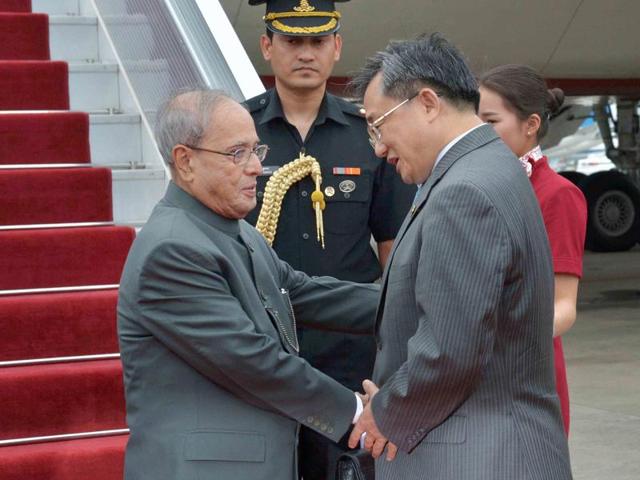President Pranab’s China challenge: Scaling the great wall of Pakistan
President Pranab Mukherjee’s first visit to China, which began May 24, comes at a crucial time. India’s relationship with its biggest neighbour is being tested again and there is a foreign hand -- Pakistan.
Diplomacy is a subtle art but times can be fickle.

Chinese premier Li Keqiang was the first foreign leader to call Narendra Modi when he took over as the Indian prime minister two years ago. It was during the 40-minute call that Modi invited President Xi Jingping to India.
When Xi came calling, he was accorded a public reception in a throwback to the Nehruvian era when the two sides shared warm ties that turned frosty after the 1962 war.
President Pranab Mukherjee’s first visit to China, which began May 24, comes at a crucial time. India’s relationship with its biggest neighbour is being tested again and there is a foreign hand -- Pakistan.
There is no other bilateral relationship where India’s ties with a third country matter so much. China is an “all-weather ally” of Pakistan and that will remain a challenge every time Beijing and New Delhi want to mend a drift in the relationship.
Two recent developments have reinforced Pakistan’s presence as the third player. And, Mukherjee will have to summon all his persuasive skills, which served him well in a long political career, to take up these issues with the Chinese leadership.
Read: Prez Mukherjee points to India’s support to China’s inclusion in global bodies
Beijing’s recent move to block New Delhi’s efforts to get Jaish-e-Mohammed chief Masood Azhar designated a terrorist by the UN has India upset. It has been closely followed by China’s opposition to India joining the elite nuclear suppliers group (NSG). Two desperate issues tied by a common thread — China batting for Pakistan.
Its scuppering of Indian move at the UN sanction committee stung a lot more this time. It came at the last moment. And, that too after India -- for the first time -- had the support of the US, France and UK for the resolution that would have forced Pakistan to act against a man, who has repeatedly targeted India with audacious cross-border strikes.
Linking India’s NSG membership issue to the non-proliferation treaty is reiteration of Beijing’s long-held position. But, here the context is crucial -- Pakistan made a formal application for the NSG membership this month.
A club of 48 countries, the NSG is dedicated to curbing proliferation of nuclear arms by controlling export and re-transfer of materials that can be used in nuclear weapons.
A look at the fine print and Beijing seems to be parroting Pakistan’s lines: The grouping shouldn’t discriminate when looking into the membership claims of non-NPT countries. India and Pakistan are not among NPT signatories. New Delhi says the agreement is discriminatory.
Getting Beijing to turnaround will not be easy. Mukherjee’s visit could be a start. It could revive the practice of senior leaders meetings regularly. The UPA did it. Bilateral meetings were common on the sidelines of every major summit attended by the leaders of the two countries.
India needs to both manage and improve relations with China. The effort will have to be sustained and not a knee-jerk reaction, like hosting people viewed by Beijing as terrorists or dissidents.
Pakistan may be a big factor but the two sides have a lot of shared interests. Fighting terror, trade, climate change and structure of global financial institutions -- to name a few. Frequent interactions will help narrow the differences and build trust. That could well be what President Mukherjee’s is aiming for.





